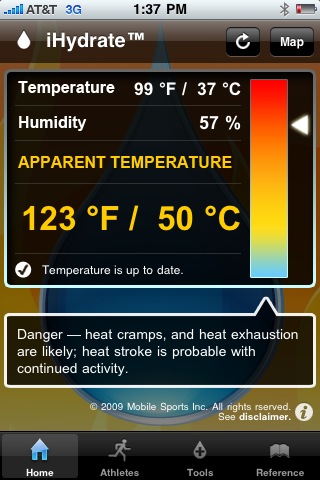I have really been feeling the heat lately, both literally and figuratively.
It began when I travelled to the steambath that was Williamsburg, Virginia last weekend to give two talks to over 1,000 parents of some of the most elite high school football players in the nation attending a four-day training camp, and the heat didn't let up when I returned to my office this week.
The heat index in Virginia was almost off the charts. By day three the heat index had peaked at 123 degrees F. The temperature on the artificial turf fields where the kids were practicing and playing was, of course, even higher, reaching 144 at one point. This truly was no place for a youth sport health and safety advocate like me to be standing (although not for long; after standing on the sidelines for 15 minutes, I retreated to the safety and comfort of an air conditioned car and hotel lobby).
Or maybe it was.
To be honest, I had given serious thought to cancelling my trip because, as one who has consistently advised sports parents visiting MomsTeam to cancel or modify youth sports practices and games when the heat index is dangerously high, as I knew it would be last weekend in Virginia, I didn't want to be seen as giving the thumbs up to exactly that; in other words, to talking the talk, but not walking the walk.
But I ended up going in part because I was interested in hearing from the moms and dads of the nation's elite high school football players - all on track for Division I schools - why there prepared to let their sons play football in such heat, and, of course, because I had promised the organizers that I would put on two parent seminars. As it turned out, the trip and my talks were a big success. While some of the parents expressed concern for their sons' safety playing in such oppressive heat, as far as I am aware, no athlete suffered heat stroke, fortunately.
But I continued to feel the heat even when I returned to the office this week, but this time the heat was coming from concerned parents. My voice mailbox was chock full of messages from parents frantically calling from all around the country, all asking variations on the same question: "My son was told they would be playing in pads (football) tonight and it is already 100 degrees in the shade where we are in Oklahoma. What should I do? He won't make the team if he cannot try out." I tried my best to answer all the phone calls, which were coming in at a rate of at least one an hour, and to respond to e-mails and Facebook posts, all asking how they could keep their kids safe in the high heat.
The problem was that I was becoming as hot and bothered as the parents. On the one hand, I knew that MomsTeam had the very best and most comprehensive Hydration Center on the Internet with some of the country's top hydration experts in the world who review and guide us to give out the most accurate up-to-date information. On the other, it seemed that, no matter how much information we provide, no matter how often coaches and programs are warned against the dangers of playing sports when the heat index soars, too many (with rare exceptions, such as the recent Schwan's USA Cup youth soccer tournament) continue holding practices and games without frequent hydration breaks, or having the ice baths on hand to rapidly cool down players if they suffer heat stroke. Either they haven't been properly educated about hydration and heat illness (which given the highly publicized deaths of high school and professional athletes is hard to fathom) or they stubbornly cling to the old school belief and macho culture that still pervades youth sports - especially in contact and collision sports like football and lacrosse - that forcing players to practice in excessively high heat somehow toughens them up and makes them better athletes, subscribing, I guess, to the old adage, "What doesn't kill you, makes you stronger."
Knowlege is power
So how do I answer the parent phone calls and e-mails? By letting them know about the guidelines many state athletic associations and programs have put in place in recent years to try to keep kids safe playing and practicing football and other sports outdoors in the heat and humidity gripping the country. I suggest that they share the link for the articles to all of their Facebook friends and to print up copies to give to the coaching staff and other parents.
Knowledge, it is often said, is power. Our mission at MomsTeam, as it has been for the past eleven years, is to empower sports parents through education. We know that more and more parents are listening. Ultimately, though, it is up to the parents to turn the heat up on the coaches so they don't do the same to their kids. If they don't, we'll all be scrambling to put out the inevitable, but preventable, fires.









